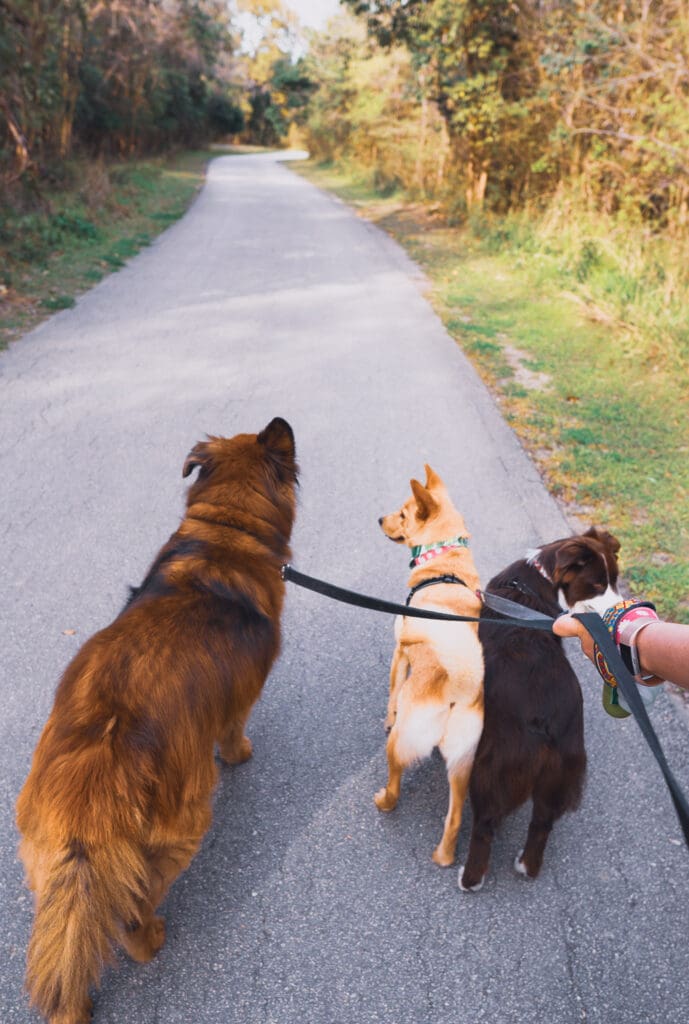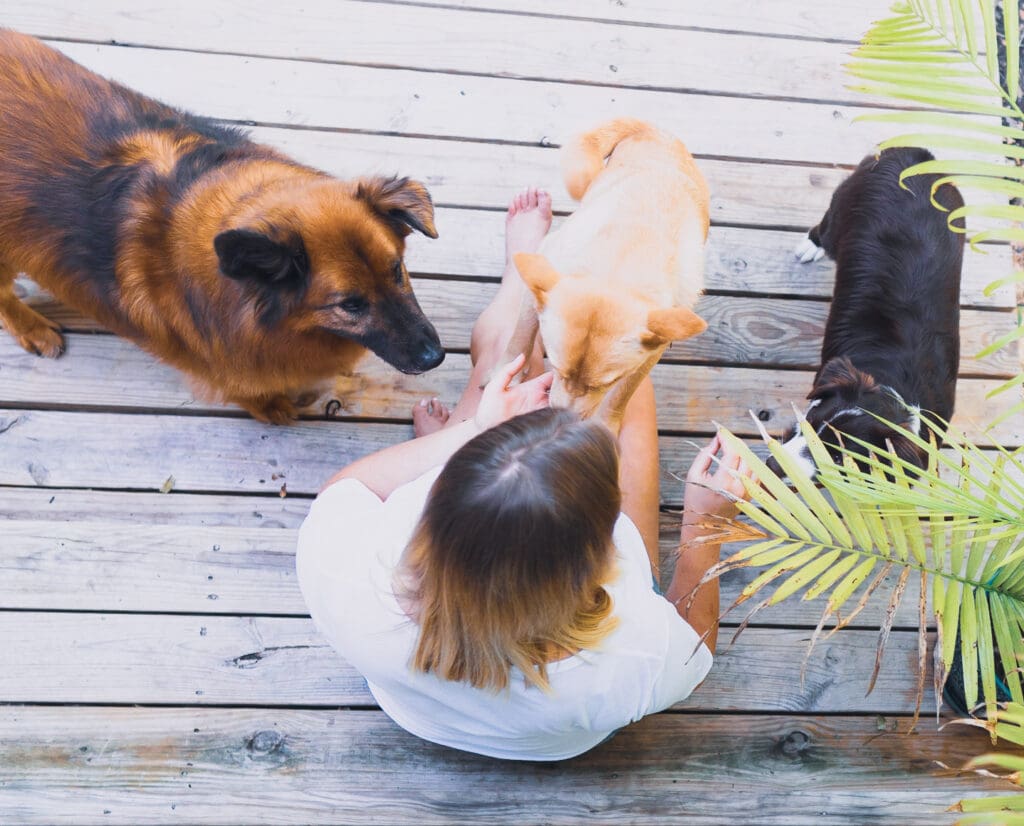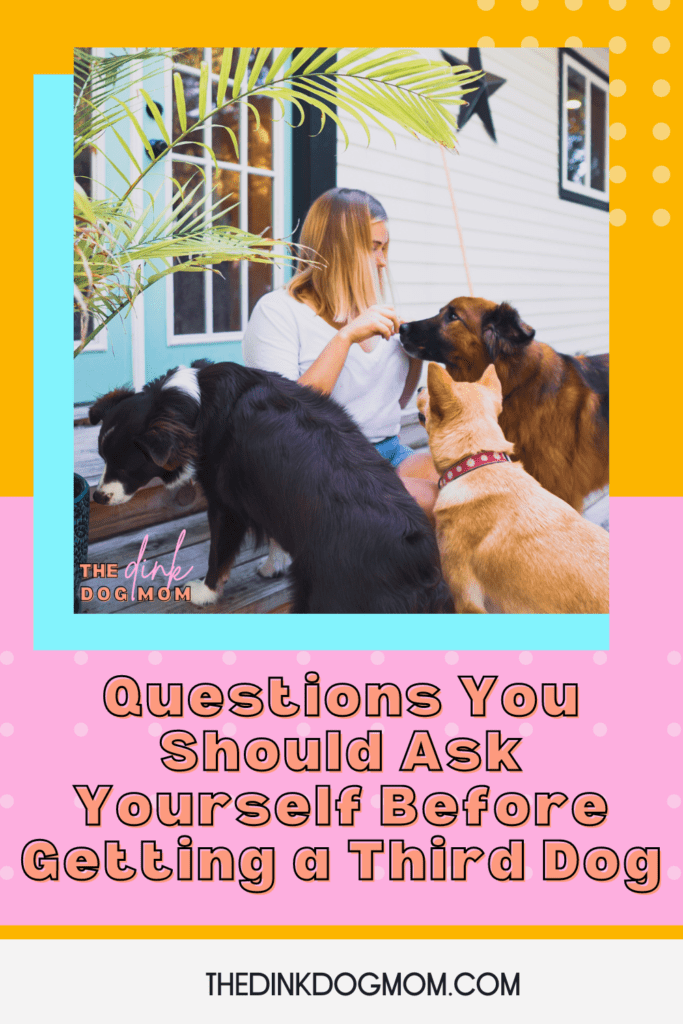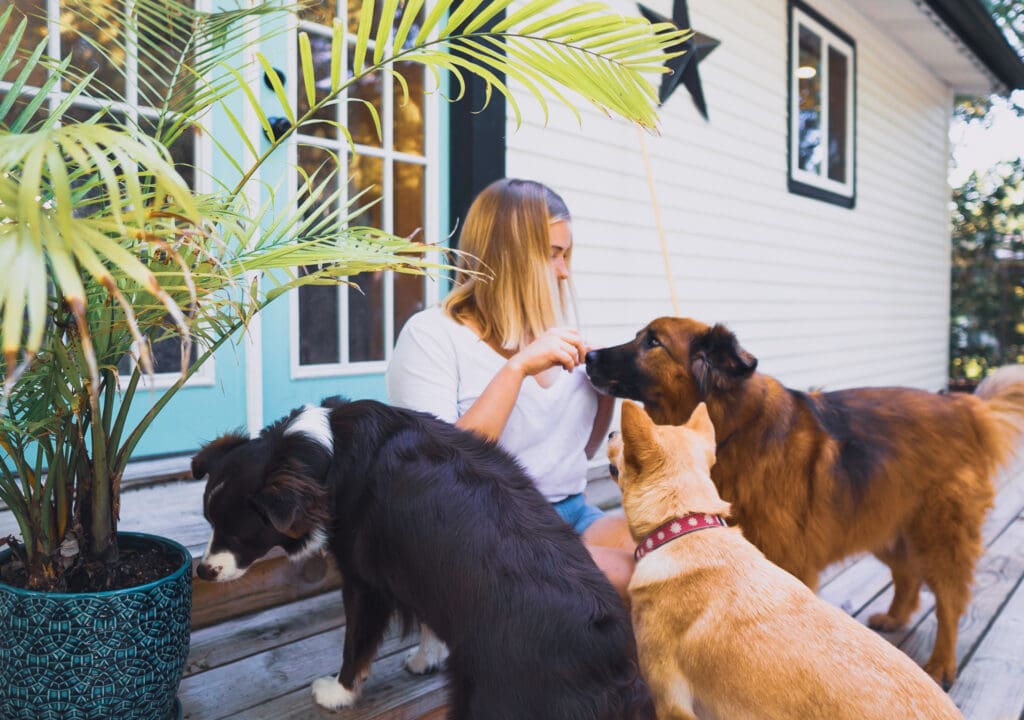We are creeping up on Margot’s Gotcha Day, and I honestly can’t believe we’ve had her almost a year. Thanks to 2020, that year has felt both longer and shorter at the same time! We’ve completed obedience together, survived a pandemic, and celebrated Margot’s first birthday. Thinking back to this time last year, I remember how nervous I was about getting a third dog. There were a lot of questions floating in my mind, but the main two were:
- Could we handle having three dogs?
- How would three dogs change our fur-family dynamic?
I had always been a one dog person. Even after Brady and I got married, our two-dog household was more like a “his and her” dog household. Mia was my dog, Totes was Brady’s dog. We were each accustomed to handling a dog, and there was no denying that getting a third dog would change that dynamic.
Ultimately, of course, we decided it was the right move, and I don’t have any regrets! As an older dog, Totes had little interest in being June’s playmate, and adding a new pup to our household changed the dynamics for the better. However, adding a third dog to the family made me realize a few important things that everyone should consider before going from 2 dogs to 3.
Pros and Cons of Getting a 3rd Dog
Bringing home a new dog is a lot of fun, whether that is a new puppy or an older dog. But it’s always a lot of work. That is especially true for multi-dog househoulds. Some of the downsides of having three dogs include the expense of dog care, trying to find one-on-one time for each dog, and the losing battle against the accumulation of dog fur.
On the flipside, the benefits of having 3 dogs include lots of playtime for your dogs, the opportunity for dogs to learn from one another, and tons of dog cuddles, of course. At the end of the day, the pros and cons of getting a third dog depend entirely on variables like your lifestyle and budget, your current dogs, and the personality of the third dog. Before you decide to add a new pup to your pack, consider the following questions.
Can you afford getting a third dog?


If you are renting, consider the fact that many places have 2 pet limits. At the very least, you are looking at an additional pet deposit. If your current place does allow more than two pets, what happens when you move? Are you willing to find another rental that allows three pets? Do you have that type of flexibility in your life and budget?
Additionally, what happens when you go out of town? If you board your pets, you will have a whole additional animal to pay for. On the other hand, if you have a friend or neighbor care for your pets while you are away, be sure to ask if they are willing to watch three instead of two. You might need to pay them more money, or hire an additional pet sitter to assist.
Do you have space for a third dog?
Obviously, this depends on the size of your dogs, but space is an easy thing to overlook when considering if you should get a third dog. If you live in a very small apartment, will three dogs fit comfortably, or will they always be underfoot? You might not think that would bother you, but it can end up causing a lot of stress and frustration, both for you AND your dogs.
What about crates? Finding space in your home to accommodate three dog crates can also be a challenge, especially for medium to large sized dogs. Do you have the square footage for this? Alternatively, do you have a safe space where you can sequester the dogs during potentially stressful situations, like fireworks, visits from maintenance, or parties/get togethers?
Finally, how big is your car? You definitely want to make sure you can comfortably AND SAFELY fit all three dogs in your car at one time. Even if you don’t plan on having all three dogs out at once, you never know when an emergency might happen that requires you to evacuate. For safety reasons, all dogs should be in a crate or at least wearing a seatbelt in the backseat, with enough slack to sit, turn around, and lay down.
How many “owners” to dogs will you have?



In our house, both Brady and I function as a dog owner. This makes caring for three dogs a lot easier. For example, although both of us can walk all three dogs at once, it helps to to split them up where one of us walks two dogs and the other walks one dog. This is especially important when you first bring a dog home and need to walk them one-on-one while leash training them and getting them used to your other dogs.
Having an additional owner also makes all other dog owner tasks easier– feeding, grooming, traveling, cleaning, and even training. If you are thinking about getting a third dog (or fourth!), definitely think about how many pairs of hands you will have to assist you.
What impact will a third dog have on your current dogs?


Although I did foster dogs while I had Mia, I never, ever considered getting a second dog. Mia enjoyed being around other dogs and occasionally playing with them, but she was very owner-focused. She took up all of my time and energy as a dog owner, and it just would not have been fair to her or to another dog to add a member to our “pack.”
June, on the other hand, really needed a playmate. This became pretty obvious within the first few weeks of adopting her. She thrived playing with other dogs, and Totes was just not the type of dog that played. Plus, he was getting up there in age! His walks were shorter, naps longer, and in the end we decided that Totes was essentially retired. One of the main reasons we decided that adopting a third dog was a good idea was because it would help fulfill June’s needs.
Do you have time for a third dog?
Generally speaking, the time it takes to care for a dog increases only incrementally when you add a second or third pet. What I mean is, caring for two dogs doesn’t take up twice as much time as caring for one dog. Some things do double or triple– like the cost of vet bills or time dedicated to one-on-one training sessions. But once you’ve molded your lifestyle to accommodate one dog, bringing home a second or third is only incrementally harder.
That said, determining whether or not you have time for a third dog is really a balance of all of the above listed factors. How much of your attention do your current dogs need? How many humans will be helping to care for the dog? What can you afford, budget-wise?
The hardest part for me was carving out “one-on-one time” with each dog. I always felt guilty spending time with just one dog, even though logically I knew I shouldn’t. When you have more than one dog, it is really important to dedicate one-on-one time with each of them in order to build your relationship. So, if this is something you feel like you won’t be able to do, then adding a third dog might not be the best choice.


Is getting a 3rd dog a good idea?
Consider your answers to all of the questions above. If you are uncertain about finances, your housing options, space, or even the dynamics of your current household, then getting a third dog is not a good idea. But, if you are comfortable with the cost of dog care for three dogs, and a third dog would have a positive impact on your current pets, then I would say go for it!
As I said at the beginning of this post, I have NO regrets about getting a third dog. We absolutely love Margot, and she balanced out our pack dynamics really well. That said, having three dogs is definitely work.
Pin It For Later








7 Responses
Wondering if you have any thoughts if it’s on how breed combination influences the decision for 3 dogs. I have two hounds and am considering adopting a terrier. I think this would work, but am concerned that the terrier may feel left out due to the different temperament it relaxed (hounds) versus more fiesty (terrier).
This is a great thing to consider! I don’t necessarily think there are any dog breeds that can’t coexist by default, but genetics and breed characteristics play a big role in dog behavior which definitely influences how well dogs might get along! Even play styles can vary by breed. I would still look at it through the lens of individual personalities and your own lifestyle. Will a busy, rambunctious terrier disrupt or annoy the relaxed hounds, or would the hounds not even care? Are you ready to fulfill a terrier’s needs (ie digging or chasing) in addition to the hounds’ needs?
I grew up in a two dog home, and they did great. Being a dog person, I always thought I’d get 3 dogs. Not anymore…
When my first dog was 4, I got a new puppy. I focused on my relationship with the new one and also let her play with dog #1. The problem came when she got bigger then dog #1. Problem is a strong word, but my dogs only tolerate each other. Dog #1 is 20lbs and dog #2 is now 50 lbs. Neither of them are aggressive, but dog #2 is a bully–she uses her size to push dog number 1 out of her way to get what she wants, taking his toys, etc. I need to figure out how to train her not do this… Anyway, long story but after my dogs growing up I expected them to play all the time together. They almost never play together, which is a bigger drain on me then I was hoping…
Dog #1 enjoys playing with some large dogs, so its not really size. I think its energy. Dog #1 hates certain personalities of dogs. (my parents bouncy Aussie is #1 on the list of hated dogs…)
To sum it up. Dog #1 and 2 have very different personalities and both want the same thing (me/toys). And dog #2 is kinda a bully. Which exacerbates the issue.
Oh man, this is a tough situation to navigate for sure! Not all dogs want a sibling, even if they are pretty dog friendly. I would definitely consider researching a professional trainer who can help teach Dog #2 to be more considerate, and help guide you on how to manage these situations. I would especially want to make sure the situation doesn’t escalate into an aggressive one!
The best part about working with a trainer is they are an objective third party who can usually spot patterns or habits that we, as owners, miss. Best of luck!